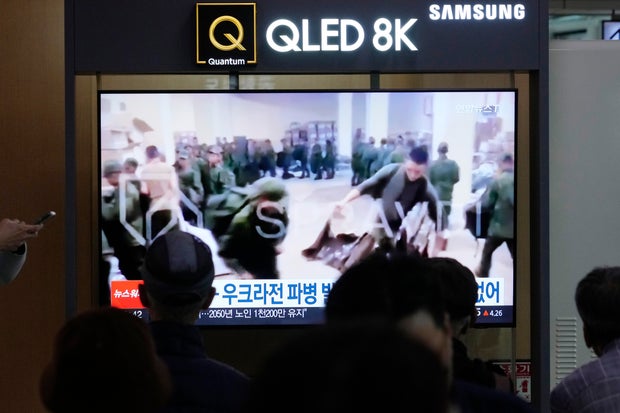Some of the 10,000 North Korean troops in Russia are moving closer to Ukraine “outfitted with Russian uniforms and provided with Russian equipment,” Defense Secretary Lloyd Austin said Wednesday.
“I am increasingly concerned that the Kremlin plans to use these North Korean soldiers to support Russia’s combat operations in Russia’s Kursk region, near the border with Ukraine,” Austin said at the Pentagon in a news conference Wednesday with South Korean Defense Minister Kim Yong-hyun.
Austin said it remains to be seen whether the North Korean troops participate in combat, but “there is a good likelihood” they will, given the high number of casualties on Russia’s side.
Ahn Young-joon / AP
One of Ukraine’s goals when it launched its surprise offensive into the Kursk area of Russia in early August was to draw Russian forces away from eastern Ukraine. That hasn’t happened in any meaningful way, according to U.S. officials. Instead, Russia has slowly been clawing back territory in Kursk while maintaining pressure in eastern Ukraine – but at a significant cost.
September 2024 registered the highest number of Russian casualties in the over two-year war, according to a senior defense official. The North Korean movements could be Putin’s way of trying to defend gains in Kursk without having to endure even higher Russian casualties or order a mass mobilization, which would be unpopular in Russia.
To sustain the war, Russia has found different sources of support. North Korea has already provided ammunition, Iran has sent missiles and drones, and China has provided technological help for Russia’s defense production.
“[Putin has] gone to other countries for weapons and munitions, and now he’s going to other countries for people,” Austin said.
Ukraine can use its weapons and weapons the U.S. has provided to defend itself, including against North Koreans who would be considered “co-belligerents”— or legitimate targets — if they enter the fight, according to Austin.
Kim, the South Korean defense minister, raised the concern that North Korea, in return for providing Russia with soldiers, may ask for technological help for tactical nuclear and intercontinental ballistic missile programs.
Kim and South Korea’s Minister of Foreign Affairs Cho Tae-yul are in Washington, D.C. this week to participate in U.S.-South Korea meetings with their counterparts at the Pentagon and State Department.

